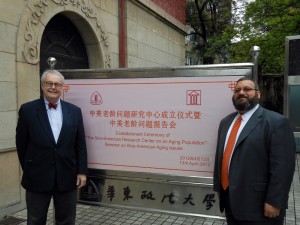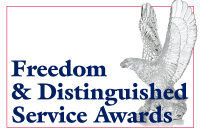
John Marshall Law School Dean John E. Corkery (left) and Professor Barry Kozak (right) signed a working agreement at Shanghai’s East China University of Political Science and Law to establish a research center dealing with elder law issues.
A new research center established by The John Marshall Law School in Chicago and China’s East China University of Political Science and Law will share information, research and writings as a collaborative project to learn how best to advocate for the independence, dignity and care for aging populations in the U.S., China and around the world.
Issues of an aging population are the focus of The Sino-American Research Center on an Aging Population, a new collaborative project between The John Marshall Law School in Chicago and the East China University of Political Science and Law (ECUPL) in Shanghai, China. It is the first collaborative project of its kind between the United States and China.
The Center will allow faculty, students and other interested academics at or affiliated with both institutions to share research through meetings, online and distance education contacts and a journal focusing on elder law. The organizing work is beginning and it is anticipated that the project will be operational by early 2013.
The cooperative agreement was signed by John Marshall Law School Dean John E. Corkery and EUCPL Academic Committee Chair Professor Du Zhichun on April 13, 2012, in Shanghai. Corkery was accompanied by Professor Barry Kozak, director of the law school’s Elder Law Studies program, and Dorothy Li, director of its Asian Alliance Program.
“We are delighted to begin this partnership for a better understanding of major issues facing both of our countries,” said Corkery. “Societal changes are forcing a close examination of how we can best care of our elderly.”
ECUPL has named several outstanding professors in civil law, legal history, religion and procedural law to serve as research fellows. They will become academic elder law authorities by examining Chinese traditional and contemporary issues impacting the country’s aging population. ECUPL also will begin offering a class on aging problems that may be expanded into a full elder law curriculum.
The Chinese experts will be the collaborative partners with John Marshall’s Kozak and members of the elder law faculty and advisory boards, who are experts in American elder law in Chicago and throughout the nation. John Marshall established its Elder Law certificate program for JD students in fall 2009. It remains one of only four law schools in the United States with a designated program focusing on the needs of the elderly.
Kozak, an Enrolled Actuary and attorney, began focusing on the needs of the elderly when he started guest lecturing in 2001 for the single elder law class then taught in the John Marshall curriculum. “It’s an area of law that continues to grow as the Baby Boomers deal with their parents’ aging issues and they anticipate what issues they’ll face in retirement and old age,” he explained.
China hopes to learn from the laws and regulations already in place in the United States, including laws protecting the elderly who have lost their mental capacities, or find themselves in abusive situations or victims of perpetrators.
Americans can write a living will that sets out instructions for physicians on life-sustaining treatment, establish durable powers of attorney for health care issues, and designate surrogates to make end-of-life decisions. In the absence of these advance directives, state and local courts have the authority to appoint guardians to act on behalf of an elder person with diminished mental capacity in legal matters.
Both local governments have been looking to their respective courts to assist the elderly with their legal issues. Kozak has been advising the Circuit Court of Cook County as it works to establish the nation’s first elder law protection court and associated Elder Justice Center.
Hao Wang, vice-president of the Basic People’s Court of JingAn District of City of Shanghai, also has been cultivating an environment of respect for and special attention to the needs of Shanghai’s elderly citizens among its judges.
Kozak and Wang, along with Wu Youmin, the director of the Shanghai Legal Service Center for the Elderly, spoke at the April 13 establishment ceremony for the Center. Kozak said the three found that their speeches highlighted the same general problems: elder abuse or neglect; longer lifespans with chronic illnesses; and diminishment of mental capacities.
“Elderly individuals are abused and financially exploited at an alarming rate in both the U.S. and China, and elsewhere around the world,” Kozak said in his speech. “One way that individual states in the U.S. have attempted to eliminate, mitigate or at least discover elder abuse is to require, under statute, that some professionals who interact with the elderly must anonymously report any suspicions of elder abuse to the police or other state agencies.”
Kozak said the organizers of The Sino-American Research Center on an Aging Population hope the Center will eventually be able to shed light on elder issues in other countries as well, such as India, Russia and Japan that are dealing with ever-increasing elderly populations.
The John Marshall Law School established its first partnership with the People’s Republic of China in 1994 when the law school and China’s Patent Office signed an agreement to provide training programs in intellectual property (IP) law to Chinese attorneys. This will be the second cooperative Center. In 2009, the law school organized the Chinese Intellectual Property Resource Center to share IP research and findings between the U.S. and Chinese IP practitioners.

